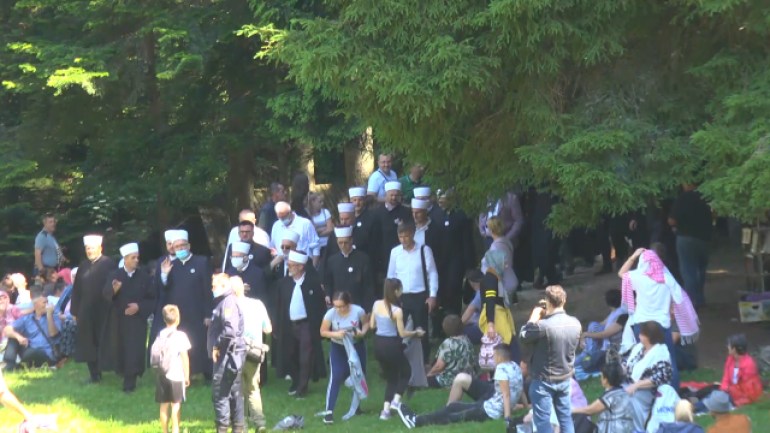Bosnia and Herzegovina witnessed, on Sunday, the conclusion of the activities of the 510 version of the "Iwaz Dada" cultural festival, which is one of the longest festivals in the country, as it lasts for days, and the Bosnians commemorate the anniversary of their entry into Islam through a person called "Iwaz Dada", according to historical accounts.
The festival concluded its activities through the performance of the participants in the afternoon prayer in congregation in an open space near the Bosnian "Prosag" area.
Within this framework, 244 days ago, knight arrived from the "Prussage" area, where the festival takes place, coming from various Bosnian cities.
In a speech to him during the festival, Ahmed Adil Ovi ،, the Mufti of the Bosnian "Travnik" and head of the festival organizing committee, said that the respect of societies for their past and history is a necessity for a good future.
In turn, the head of the Islamic Federation of Bosnia and Herzegovina, Husayn Qawaz Ovic, praised the history and past of the Bosnian people.
According to historical accounts, "Ioaz Dada", whose roots are from the Turkish Anatolia region, arrived in the Bosnian "Prossage" 510 years ago, at a time when the region was suffering from droughts and droughts.
After his supplication and worship in the region for 40 days, Ioaz Dada found a river descending from a mountain and was able to rid the inhabitants of droughts and droughts, which they considered a miracle, and they subsequently embraced the religion of Islam, but for the chronicles of historians another opinion.
Legend and history
A large number of Bosnians converted to Islam after the Ottoman conquest of the region in the second half of the 15th century, but the Bosniaks' Islam was gradual and took up to two centuries until it became the religion of the majority.
Christianity had relatively shallow roots in Bosnia before the Ottoman hegemony, and the Bosniaks (unlike the Serb and Croats) lacked a strong Christian church due to the lack of priests and rivalry between the splintered Orthodox, Catholic, and Bosnian churches that collapsed shortly before the arrival of the Ottomans.
In his history of this great transformation, Thomas Arnold (1864-1930), the famous British historian and orientalist considered that the followers of the Bosnian Church were more receptive to converting to Islam since they were seen as innovators by the Catholic Church, and their religiosity was different from common Christian doctrines, they refused to sanctify Virgin Mary rejected the cross as a religious symbol and considered that the bowing to religious icons and symbols was pagan in nature.
Although some European historians agree with Sir Arnold in his theory of religious conversion in Bosnia, others see it as oversimplification, especially since Bosnians of all Christian denominations have converted to Islam, including followers of different Catholic and Orthodox churches and not only the Bosnian Church to which many of them do not belong Former residents as well.
Historians say that the beginning of the Ottoman era in Bosnia and Albania was associated with various religious transformations, including the conversion of many Catholics to Orthodoxy and vice versa.
Slow shift
The gradual conversion of Islam continued at different rates between the different groups in the region, and in the urban areas, which served as centers of Ottoman learning and administration, were more than the countryside, and religious transformation was more common among the merchant class, and by the 17th century, the majority of the population of Bosnia was Muslim.
Bosnia and Herzegovina remained a province in the Ottoman Empire and gained autonomy after the Bosnian uprising in 1831, and after the Berlin Conference in 1878 to demarcate the borders of the territories of the Balkan countries in the wake of the Russo-Turkish War between 1877 and 1878, Bosnia and Herzegovina came under the control of the Austro-Hungarian Empire that approved a constitution that allowed Freedom of religion.
After expelling the Muslim population from many Balkan regions in the period of unrest at the end of the 19th century, Bosnia, along with Albania and Kosovo, remained the only parts of the Ottoman Empire in the Balkans where large numbers of people converted to Islam, and they remained there after independence from the Ottomans.

